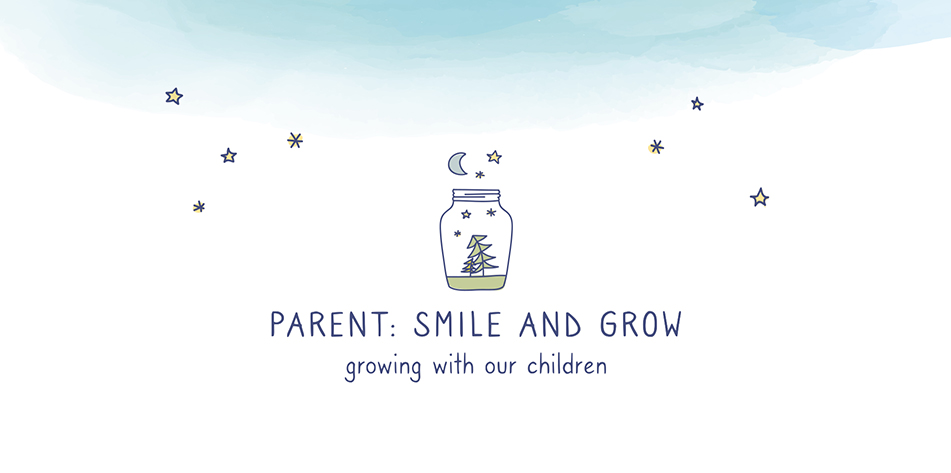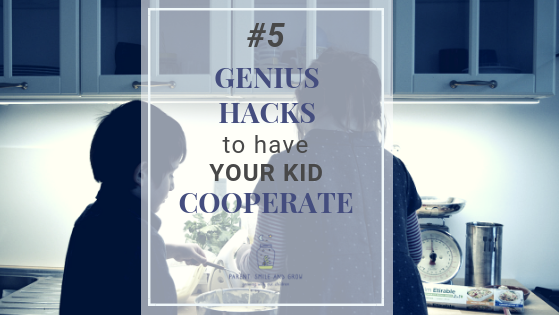Did you brush your teeth? Come on, put your sweater on! And where are your shoes? Honey, but you’re 5 years old, how come you can’t get dressed on your own ?! Come on, we’re late !! Does it sound familiar? Is getting on time to work becoming an impossible mission? Then, these 5 hacks to get your kids to cooperate will help !
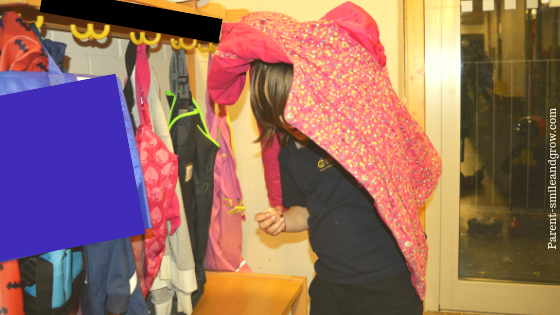
Table of Contents
Preface. Secrets to get your kids to cooperate? They don’t exist. (Or do they ?)
“Hurry up, we’re late, come on, here are your shoes, and put on your coat.” “IDONTWANTTO!“
“But honey, it’s cold, can’t you see the penguins out there? You can’t go out without your coat on.”
“NO, NO AND NO, I AM NOT PUTTING MY COAT.“
Typically, in its variants, the scene continues as follows:
- after exhausting the list of valid reasons for which one should wear a jacket on winter mornings, especially when there’s a 40-minute-bike ride waiting, I seize my son by force;
- I put on his jacket as he shouts, kicks, pushes me away and cries like a convict under torture;
- and then, I drag him between the astonished glances of neighbors and passers-by.
- When we get to school, the crisis is (almost) over.
Am I the only one ? Of course, the same could also apply for other clothing garments.
I was fed up with these morning disputes, which added to a tight timing; where I tried (often in vain) to keep a semblance of good mood.
So I started looking, experimenting, changing. And I found some secrets to make the children collaborate!
Some tips that really saved me on more than one occasion. If you too are struggling every day to get a minimum of cooperation, read on 😉
Secrets to get your kids to cooperate : #1. Let them experience !
One day, I discovered Jane Nelsen’s work and website on positive discipline.
Have your children experience what they need to learn. All learning is experiential; that is to say, we learn well when we experience something. The children will then know how to make their choice by themselves.
Very well. Let’s try. The next morning, there we are : put the jacket on before we leave. “I don’t want to!” and there, surprise!
Rather than getting irritated and protesting, I let go a calmer:
“OK. If I were you, I’d at least take the jacket with me, just in case you get cold. “
(Which of course, my kid didn’t do).
The first time, everything went well. But on the second day, temperatures had dropped ..
After about twenty minutes, my son started whining.
“I’m sorry, you’re so cold, we’ll be there soon, hold on!”
I bit my tongue a few times not to shout the most hated: “I told you !!“
On the third day, I went again with my “Shall we put the jacket on?“
One, slight hesitation. Drum roll.
“Do you remember how yesterday you’d chosen to leave your coat here at home? I wonder how it went for you … It seems to me that you were cold, maybe you want to make a different choice today ?“
“Yes I was very, very cold, today I put the jacket on.“
Imagine my sly and satisfied smile in disguise.
Post-it to the first secret : accept to limit your control
It was an incredibly useful lesson for me: to let my child experiment, to be wrong too, without trying to control him …
These discussions take place very often in our house.
I don’t think I’d done it in the middle of the winter, under the snow.
But it was interesting to reflect upon our desire for control : it is difficult to accept that our child doesn’t do what we tell him; that he doesn’t understand that’s for his own good!
And that he can make a different choice than what we’d like .. (like : enrolling for Actor’s studio instead of engineering school? Or moving in with the boyfriend we can’t stand? Oh no .. That comes later !)
Then I realized that letting my kids doing mistakes now, when consequences are minimal, is better. Worst case, they’ll catch a cold !
I confessed in the article on the power of choice, what an illuminating revelation it was to interpreting choice as a way of learning cause – effect relationship, consequences and responsibility.
The more children practice choosing when they are small and their poor choices have limited consequences, the less likely they’ll make big mistakes during the critical age of adolescence….
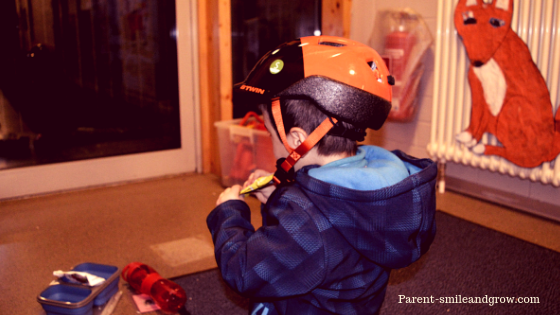
A visually stunning poster to help your kids memorize their strategies, you can get it here!
Secrets to get your kids to cooperate : #2. The power of choice and the responsibility of the consequences
Think in terms of goals and strategies. Prepare strategic choices for your child when you want everything to run smoothly. (Offers two options you’re ok with).
Or, let your child make his own mistakes, and experience the consequences. We discussed it during our parenting class at school. It made sense.
We can make a list of “critical” situations and imagine alternatives:
“Red or blue sweater?“
“Trousers or tights?“
“Cold milk or hot milk?”
“Do we brush our teeth first or do we get dressed?“
“Do you want to wear your coat or you hold it? ” and so on.
Most importantly, don’t give in to the third option! At first, my kids were always trying to come up with something different.
Or hesitating and not choosing.
Post-it to the second secret : your kids cooperate, to do what?
Nevertheless, I admit that, unconsciously, I often said to myself:
“They are still so young!”
I don’t want to admit that I don’t feel like spending more time correcting or directing their actions.
But, why not letting them dust ? Put and clear the table for dinner ? Help me put the laundry away ? Pick up their toys? Get dressed? The list is sooo long.
How can I expect that one day, after celebrating their birthday (by the way, which one?), they’ll start giving me a hand?
“Mom, but you’ve always done it yourself!” my daughter already tells me.
Of course, it can happen that they drop a plate and break it. They will also have to learn to collect the pieces 😉
This requires an investment of time and energy now .. for a huge benefit tomorrow. Only, I’d never thought about it before.
Secrets to get your kids to cooperate : #3. Reinforcing communication – I instead of YOU!
Which brings me to the third strategy. Learn to use phrases and sentences that you can reinforce !
In short, instead of giving orders that often remain unheard (to be totally honest, who feels like obeying to someone’s orders?); let’s use the first person.
We can explain what we are going to do, and the possible consequences for the child’s choice.
Let me go back to the story of the girl who went to school in her pajama :
“The car leaves in ten minutes; do you want to put your clothes on you or in your bag and go to school in your pajamas?“
Having a timer is also a great idea. Another example:
“I leave breakfast on the table until the timer rings, then I’ll clear the table and we’ll leave. Make sure you eat enough to resist until lunchtime!“
But, you have to be willing to accept that your kid could choose not to eat, and to experience arriving at lunch on an empty stomach.
Post-it to the third secret : some examples of collaboration !
Thus reasoning and experimenting, it happened that my son had to put his shoes in the garage, because he’d refused to put them on by himself in due time.. It’s cold without shoes! Now he wears them straight away.
Or that he complained for having to pick up the huge pile of books and magazines he had thrown everywhere while playing. The next day, as he began to throw everything out once more, he remembered and stopped !
Same story with the evening bath. Tired of the umpteenth flood, I gave my two children a mop and a broom, and told them:
“I’ll come back when the floor is dry.“
Two minutes later : “Mom, this is so tiring!“
Welcome to my world..
But you know, after two or three weeks of drying the floor, now they don’t shed a drop. Ha !
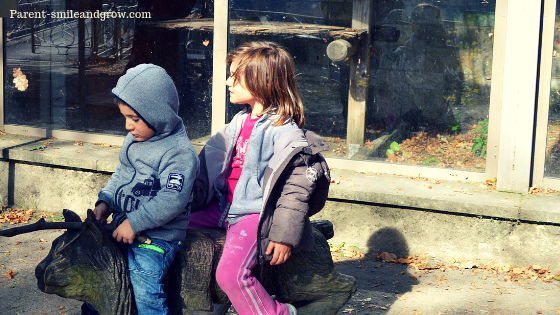
Secrets to get your kids to cooperate : #4. Just Play 🙂
“Can we play pretend?” often asks my son. In its different forms, it’s a game everyone loves.
My daughter likes pretending to be a mom, my son to manage a restaurant.
Taking advantage of this passion to review problematic situations is such an incredible winning strategy.
You can adapt it to almost anything: arrogant phrases, violent reactions, leaving the house in the morning..
We enjoy a moment of calm and go through the scene again (maybe reversing the roles! Children love pretending to play our parents).
“Let’s pretend we’re sleeping, then the alarm rings and we have to get ready for school !”
But that’s not enough. Play, laughter are a huge part of the children’s world. Yet, we often forget it. Believe me, using games and playfulness on a daily basis improves so many things.
A visually stunning poster to help your kids memorize their strategies, you can get it here!
Post-it to the fourth secret : some more examples
The other day, I had an illumination. My daughter had a field trip for which we had to be at school before 8 am.
To illustrate the difficulty, let’s say we usually leave the house at 8 o’clock. We needed a plan.
Although my daughter was motivated to hurry, we were following the usual patterns: “I don’t want to get dressed by myself, I want you to dress me, I want you to stay with me“, etc. .. I
n short, I was still in my pajamas and we needed to hurry.
Right the day before, I’d just read an article about the importance of putting everything into play when we want to get our kids to cooperate.
I’d tested the technique by mimicking a horse whenever my son refused to go brush his teeth, and it actually worked great.
And bam, idea: I scattered shoes and jackets in strategic places around the house, creating a kind of race.
Then I put the children on the starting line; I explained to them that the goal of the race was to be ready before the big hand showed the 6 (7.30 am).
They had the right to help each other, of course.
1, 2, 3, go!
And I went to get dressed.
They were fully ready, backpack and bike helmet on, when I was still getting dressed!
Secrets to get your kids to cooperate : #5. Mix all the above strategies!
During the parenting class, we talked for a long time about the problem of getting dressed in the morning, getting to the office on time, and avoiding stressful quarrels every day.
(The good news is that you are not alone !!)
The secrets I shared today partly come from this exchange..
What I learned is that these strategies need to be used together, every day, and adapted to your family and situation. (For example, now that winter is coming, it’s hard for my son to go to school in his pajamas as we ride our bikes …)
The real secret is the change of perspective. And it works, if we remain calm, and play a little too! There may still be some No days, but that’s ok. Life goes on.
And when they do cooperate.. let’s celebrate !
After the famous race, once in the elevator, I took care to congratulate myself with my children.
“You must be proud of your success and team work!“
(My daughter’d helped her brother put on his shoes)
“You should really choose how to celebrate.”
(Guess what? Eating chocolate for dessert ! 😉 )
Now, I don’t know if we can run a competition every day, maybe at some point they’ll get bored.
But the fact is that you must have several aces in your sleeve and be ready to use them. It becomes a habit, a way of being.
One last idea to try? Take pictures of your children as they perform the various morning tasks; print them and make a poster to hang in their room or in the hallway.
In the bathroom of the school, my children have one with the steps to wash hands; since they saw it, they also remember it at home.
Ahhh, what am I going to write when my mornings will go right as rain??? 😉
Do you know someone who struggles in his/ her every day attempt to leave home on time? Maybe these secrets will be useful! Tell us what happens when you try them and if you have other tricks to suggest, I’ll be happy to test them!
